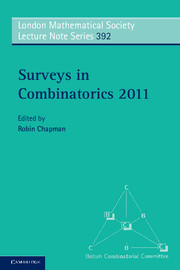Book contents
- Frontmatter
- Contents
- Preface
- 1 Counting planar maps, coloured or uncoloured
- 2 A survey of PPAD-completeness for computing Nash equilibria
- 3 Hypergraph Turán problems
- 4 Some new results in extremal graph theory
- 5 The cyclic sieving phenomenon: a survey
- 6 Order in building theory
- 7 Graphs, colours, weights and hereditary properties
- 8 Random geometric graphs
- 9 Transversals in latin squares: a survey
3 - Hypergraph Turán problems
Published online by Cambridge University Press: 05 August 2011
- Frontmatter
- Contents
- Preface
- 1 Counting planar maps, coloured or uncoloured
- 2 A survey of PPAD-completeness for computing Nash equilibria
- 3 Hypergraph Turán problems
- 4 Some new results in extremal graph theory
- 5 The cyclic sieving phenomenon: a survey
- 6 Order in building theory
- 7 Graphs, colours, weights and hereditary properties
- 8 Random geometric graphs
- 9 Transversals in latin squares: a survey
Summary
Abstract
One of the earliest results in Combinatorics is Mantel's theorem from 1907 that the largest triangle-free graph on a given vertex set is complete bipartite. However, a seemingly similar question posed by Turán in 1941 is still open: what is the largest 3-uniform hypergraph on a given vertex set with no tetrahedron? This question can be considered a test case for the general hypergraph Turán problem, where given an r-uniform hypergraph F, we want to determine the maximum number of edges in an r-uniform hypergraph on n vertices that does not contain a copy of F. To date there are very few results on this problem, even asymptotically. However, recent years have seen a revitalisation of this field, via significant developments in the available methods, notably the use of stability (approximate structure) and flag algebras. This article surveys the known results and methods, and discusses some open problems.
Acknowledgements
Research supported in part by ERC grant 239696 and EPSRC grant EP/G056730/1. Thanks to Dan Hefetz, Dhruv Mubayi, Richard Mycroft and Oleg Pikhurko for helpful comments and corrections.
Introduction
The Turán number ex(n, F) is the maximum number of edges in an F-free r-graph on n vertices. It is a long-standing open problem in Extremal Combinatorics to develop some understanding of these numbers for general r-graphs F. Ideally, one would like to compute them exactly, but even asymptotic results are currently only known in certain cases. For ordinary graphs (r = 2) the picture is fairly complete.
Information
- Type
- Chapter
- Information
- Surveys in Combinatorics 2011 , pp. 83 - 140Publisher: Cambridge University PressPrint publication year: 2011
Accessibility standard: Unknown
Why this information is here
This section outlines the accessibility features of this content - including support for screen readers, full keyboard navigation and high-contrast display options. This may not be relevant for you.Accessibility Information
- 80
- Cited by
